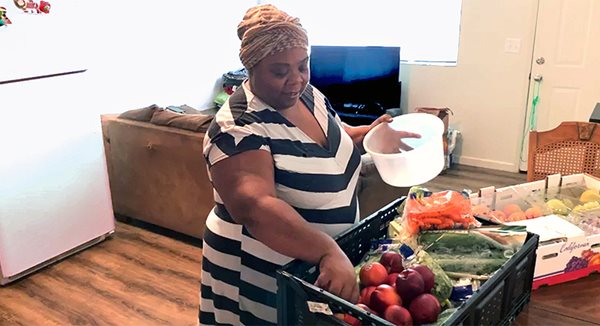“In these baskets we get things like cabbage, lettuce, carrots, cucumbers, squash, a variety of fruits,” Rowe described as she unloaded perfect nectarines into a bowl. “A week ago we got collard greens. I’m into my culture and that was a blessing. It was a godsend … it means a lot to us to have a variety of fruits and vegetables.”
 Rowe’s godsend comes from local farmers, food processors and grocery stores in Fresno who provide produce they can’t use or must turn over before it spoils. Fresno Metro Ministry redistributes the food through its “Food to Share” program.
Rowe’s godsend comes from local farmers, food processors and grocery stores in Fresno who provide produce they can’t use or must turn over before it spoils. Fresno Metro Ministry redistributes the food through its “Food to Share” program.Support to create a food hub in a food desert
Since the COVID-19 pandemic, the nonprofit has seen a big increase in the number of families struggling to buy food or secure their next meal. Community Health System has invested community benefit funding for the past three years to help Metro Ministry expand the program and keep up with growing food insecurity in the area.In April, Metro Ministry broke ground to start construction on the St. Rest + Food to Share Hub Project to convert a vacant warehouse into a modern food storage facility with commercial kitchens and meeting rooms. Community was one of the top six funding contributors, which includes government support and grants for the $6.27 million project.
Craig Wagoner, Community’s chief operating officer, said the health system is a “stalwart advocate” of the project which “will be a catalyst campus for food distribution and community programs that enhance the health of Southwest Fresno, while bringing a beautiful new asset that helps revitalize the neighborhood.” In a letter of support for the St. Rest + Food to Share Hub, Wagoner wrote: “The Southwest Fresno community is one of the highest poverty, chronic disease and pollution-burdened food desert communities in the nation.”
Among the nation’s top-ranked food hardship areas
Fresno consistently ranks in the top five metro areas in the nation for the percentage of households that struggle to afford food or who do not have enough food, according to the Food Research and Action Center. The food policy and advocacy center teams up with Gallup to survey the nation’s urban centers on food insecurity issues. More than 25% of Fresno County residents live below the federal poverty level.“Fresno, California, is one of the richest food production areas in the world and we ranked as the third-highest food hardship metropolitan area in the United States,” said Keith Bergthold, executive director of Fresno Metro Ministry. “How does that happen? It happens because of poverty and because supermarkets have moved out of West Fresno and other parts of our community leaving people adrift in terms of access to healthy food. And we discovered millions of pounds of food are being wasted every year here, and yet people are going hungry.”
“Nutritional needs” was identified as one of the top five most pressing health needs in the region. Community’s support of Metro Ministry is just one part of the community benefit investments it provides annually as a nonprofit hospital system and the Valley’s safety net healthcare provider. In fiscal year 2022, Community invested $269 million, on such direct funding, outreach, medical training, public education and unreimbursed charity care.
Nearly 1.6 million pounds of saved food shared last year
Food to Share rescued and redistributed 1.59 million pounds of food in 2022, said Bergthold. “But with the right investment we have the chance to do tens of millions of pounds. We’re so proud to work with Community to ramp this up.”Currently Food to Share collects from 116 food donors, including grocers, food processors and school districts and drops off food at 43 churches and community-based organizations that have long-standing food giveaway programs. The program’s workers also collect from local farmers who have extra produce that would otherwise go to waste.
Bergthold explained, “This is about food waste and feeding the hungry, but it’s also about the environment. The food we waste gets buried in landfills and then decomposes and gets released as methane gas into the environment. For every pound of food we save and get to someone who needs it, we’re eliminating 2.2 lbs. of greenhouse gas.”
Just because much of the food would normally be destined for a landfill doesn’t mean it’s not good food. “It’s really beautiful food that will last a long time,” said Bergthold. “We’ve built relationships with our partners that now they’ll give us food well in advance of the expiration date.”
Milk, frozen meat, yogurt cups and bakery items are regularly part of the food that the Smart & Final store at Valentine and Shaw avenues donates. It’s food no longer suitable for retail but still good for consumption, explained Smart & Final regional manager Jim Wood. “We’re committed to giving back, improving the quality of life and nourishing the communities we serve,” said Wood, who oversees several stores.
Communal gardens and cooking lessons encourage better nutrition
Fresno Metro Ministry’s efforts to address food insecurity locally now include nutrition education and cooking classes at community centers and churches. The organization has also helped create 14 acres of community garden space in four low-income neighborhoods, where aspiring farmers are mentored, food waste is composted and more fresh food is produced.Metro Ministry’s community gardeners harvested and sold 18,051 pounds of produce in food-insecure neighborhoods last year. Gardeners have planted 76 fruit-bearing trees and 15,000 square-feet of native plants that support and foster bees.
Generosity and sharing from neighbor to neighbor
Jackie Holmes, who calls herself “the boss” of her El Dorado Park neighborhood, is on the receiving end of Smart & Final’s generosity. She helps organize the weekly food delivery among the collection of subsidized housing and low-cost apartments near Fresno State’s campus.Holmes estimated that 1,800 people living in her little neighborhood regularly benefit from the Food to Share program. “The people who do the work and handing out are the residents themselves here,” said Holmes as she directed 16-year-old Michael Lopez to drag a wagon full of food boxes to the next apartment.
“During wildfire season, we saved a pallet of food to take up for people displaced from fires. When the Metro Ministry vans go up the hill, my truck goes too with kids from here to help deliver. Everyone needs to experience giving as well as getting,” Holmes said.
Holmes, who was a Metro Ministry board member years ago, has a long history of involvement with community organizing. She said Food to Share certainly is teaching the next generation in her community “that it’s all going to be all right.”







